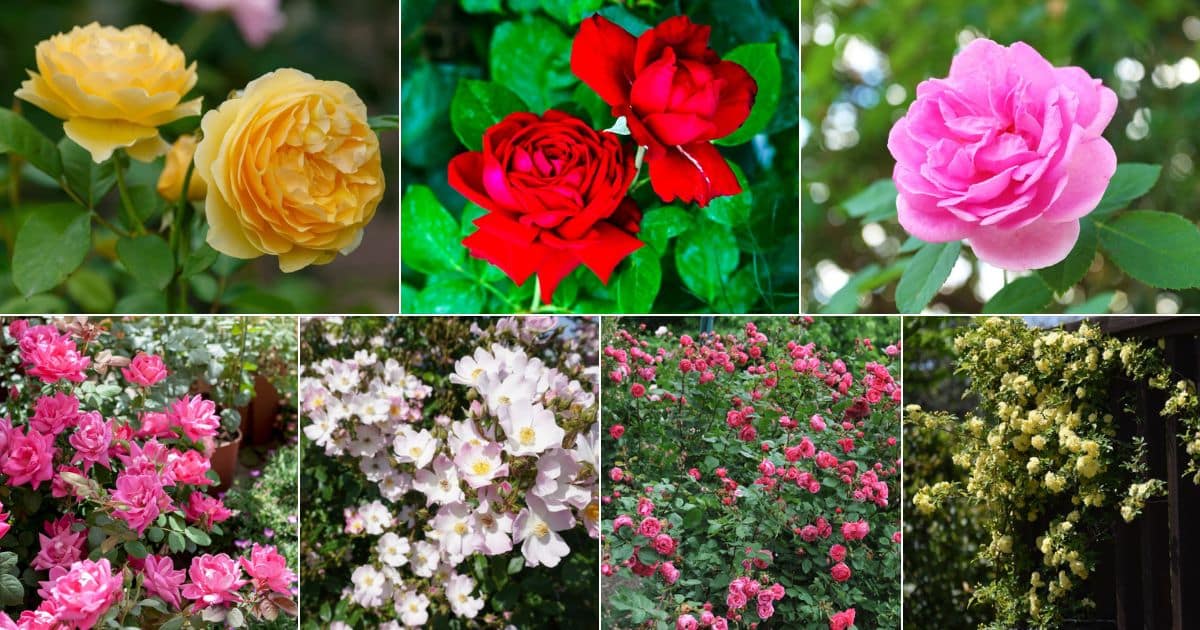Grow Beautiful Drought-Resistant Roses With These Tips
Drought-resistant roses are the key to a water-efficient, beautiful garden. Learn which varieties work best for your region.
Mar 01, 202512.2K Shares176.9K Views

It is indeed possible to enjoy roses in drought conditions; the key lies in selecting drought-tolerant varieties and implementing thoughtful gardening practices. By focusing on the right roses and planning ahead, you can cultivate a stunning garden even in limited moisture conditions.
Understanding Drought-Resistant Roses
Drought-resistant roses are specially bred to thrive with minimal water. They possess deep root systems and can adapt to various soil types and conditions, allowing gardeners to enjoy beautiful blooms even during dry spells.
Recognizing their unique characteristics helps gardeners make informed decisions about cultivation and care.
Key Characteristics
- Deep Root Systems: These allow the plants to access moisture deeper in the soil.
- Adaptability: Many old garden roses and species roses perform well under varying climatic conditions.
Benefits Of Drought-Resistant Roses
Environmental Benefits
- Water Conservation: Drought-resistant roses require less frequent watering, helping conserve valuable water resources in regions prone to dry conditions.
- Soil Health: These plants improve soil structure, prevent erosion, and promote biodiversity in the garden.
Aesthetic Advantages
- Variety: Drought-resistant roses come in various colors, shapes, and sizes, allowing for diverse garden designs.
- Seasonal Interest: Many varieties bloom from spring through fall, providing extended beauty throughout the year.
Embracing drought-resistant roses not only benefits the environmentbut also enhances the overall aesthetics of your garden.
Best Drought-Resistant Rose Varieties
Several varieties of drought-resistant roses stand out for their beauty and resilience.
- Knock Out Roses: Known for their prolific blooms and disease resistance, these roses thrive with minimal care and are available in multiple colors.
- Rosa Rugosa: This hardy species features fragrant flowers and is perfect for coastal gardens due to its ability to tolerate salt and wind.
- William Baffin: A climbing rose known for its hardiness and ability to thrive in heat, producing beautiful clusters of pink blooms.
- New Dawn: Another vigorous climber that performs well in dry conditions, showcasing lovely pink flowers throughout the season.
- Lady Hillingdon: This climbing rose is noted for its drought tolerance and sweet fragrance.
- Arctic Blue: A resilient shrub rose with icy purple flowers that stands up beautifully to heat and drought.
- Iceberg: A versatile rose with snowy white blooms that thrive in various climates, particularly known for its cold hardiness.
- Hansa: A rugosa rose with large magenta blooms and an intoxicating clove fragrance, excellent for extreme conditions.
- Orange Freedom: A low-maintenance shrub rose with vibrant apricot blooms that thrive in low-water gardens.
These varieties flourish in dry conditions, making them excellent choices for sustainable gardening.
Care Tips For Drought-Resistant Roses
To ensure your drought-resistant roses thrive, consider the following care strategies:
Watering Practices
- Deep Watering: Water deeply but infrequently to encourage deep root growth. This method allows the roots to access moisture even in dry conditions.
- Timing: Watering in the morning minimizes evaporation, ensuring more water reaches the roots.
Mulching Techniques
Apply Mulch: A 3 - to 4-inch layer of shredded hardwood mulch helps retain soil moisture, stabilizes temperatures, and improves soil health.
Soil Requirements
Well-Drained Soil: Ensure the soil has good drainage to prevent root rot. Incorporating organic matter, like compost, can enhance soil structure and fertility.
Pest Management
Encourage Beneficial Insects: Attracting pollinators and natural predators reduces the need for chemical interventions, promoting a healthier garden ecosystem. Incorporating organic pest controlmethods, such as using beneficial insects or natural sprays, ensures your garden remains free from harmful chemicals while keeping pests in check. Implementing these care strategies helps maintain healthy, vibrant drought-resistant roses.
Creating A Drought-Resistant Garden
Designing a garden that complements drought-resistant roses involves selecting other drought-tolerant plants. Consider incorporating:
- Lavender: Thrives in dry conditions and attracts pollinators.
- Succulents: Low-water plants that add texture and interest.
- Sedums: Hardy ground covers requiring minimal maintenance.
Combining these plants with drought-resistant roses creates a cohesive and sustainable garden design.
Common Mistakes To Avoid
To ensure the success of your drought-tolerant roses, be mindful of these common gardening mistakes:
- Overwatering: Many gardeners inadvertently overwater, leading to root rot. Always check soil moisture before watering. Knowing how to water your roseshelps maintain their health by ensuring deep but controlled hydration.
- Neglecting Mulch: Failing to apply mulch can result in quicker evaporation and increased watering needs.
- Ignoring Soil Quality: Poor soil conditions can inhibit root growth. Regularly amend the soil to support healthy rose plants.
Avoiding these pitfalls will help your drought-resistant roses thrive.
Additional Strategies For Enhancing Drought Tolerance
To further improve the resilience of your roses, consider these strategies:
- Use Graywater: Collect water from household activities (like showers) to water your garden, promoting sustainability.
- Soil Moisture Meters: Invest in moisture meters to accurately gauge when to water, ensuring your plants receive the right amount of hydration.
- Microclimates: Select planting locations that offer shade during the hottest parts of the day to reduce plant stress. Incorporating maintenance tipslike this helps ensure that your roses thrive even in challenging conditions.
FAQs
What Are The Best Conditions For Growing Drought-resistant Roses?
Drought-resistant roses prefer full sun and well-drained soil. They thrive in areas with minimal humidity and require watering only when the soil is dry.
How Often Should I Water Drought-resistant Roses?
Water deeply every two to three weeks during dry periods. Allow the soil to dry out between waterings to promote strong root growth.
Can I Grow Drought-resistant Roses In Pots?
Yes, you can grow them in pots, but ensure containers have good drainage and use a potting mix that retains moisture without becoming soggy.
Are Drought-resistant Roses More Pest-resistant?
While they tend to be hardier, regular monitoring and care are still essential to protect them from pests and diseases.
Conclusion
Drought-resistant roses offer a sustainable solution for those looking to enjoy beautiful blooms while conserving water. By selecting the right varieties and implementing effective care strategies, you can cultivate a thriving garden even in challenging conditions.
Embrace the beauty of drought-resistant roses and contribute positively to your local ecosystem. Share your experiences with these resilient plants and join a community of fellow gardeners dedicated to sustainable practices.
Latest Articles
Popular Articles

